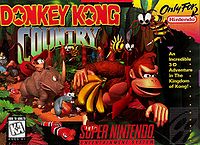| Site Notice |
|---|
|
Difference between revisions of "Donkey Kong Country"
m |
m |
||
| Line 19: | Line 19: | ||
|releaseau=1994 (SNES)<br>December 7, 2006 (VC) | |releaseau=1994 (SNES)<br>December 7, 2006 (VC) | ||
|releasekr=November 25, 2008 (VC) | |releasekr=November 25, 2008 (VC) | ||
| − | |esrb=K-A | + | |esrb=K-A (original)<br>E (re-releases) |
|acb=G | |acb=G | ||
|cero= | |cero= | ||
Revision as of 16:32, 21 March 2016
| 35px | This article is a short summary of Donkey Kong Country. dkw features a more in-depth article. |
- This page refers to the original Super Nintendo Entertainment System game. For other uses, see Donkey Kong Country (disambiguation).
| Donkey Kong Country | ||||||||||||||
| スーパードンキーコング | ||||||||||||||
| ||||||||||||||
| ||||||||||||||
| ||||||||||||||
| ||||||||||||||
|
Donkey Kong Country is a Donkey Kong video game that was first released for the Super Nintendo in 1994. The game is the basis of the modern Donkey Kong series, introducing a number of aspects that would later become staples in the Donkey Kong series. In this game, Donkey Kong and Diddy Kong must stop King K. Rool and his Kremling Krew and retrieve all of their bananas from their Banana Hoard back.
Donkey Kong Country was developed by Rare using their experience with what they referred to as "ACM" (Advanced Computer Modeling), the process by which a 3D model of a character is created and animated, then converted into a pre-rendered 2D sprite.
Later in 2000, the game was ported to Game Boy Color, and was even later remade for the Game Boy Advance in 2003; both of these versions feature more gameplay elements. The original version was also ported to the Wii's Virtual Console service in 2006, and later to Wii U Virtual Console in 2014/2015.
Blurb
"Donkey Kong is back with a new sidekick, Diddy Kong, in a crazy island adventure! Challenged by the crazed tribe of reptilian Kremlings, they endeavor to get back their stolen banana horde! Armed with lightning-quick moves, chest-pounding muscle and awesome aerial acrobatics, our duo is ready to face their cunning adversaries. With the help of Donkey Kong's quirky family and his wild animal mounts, they squabble and scamper their way through unending monkey mayhem!"
Story
King K. Rool has invaded Donkey Kong Island and taken Donkey Kong's precious Banana Hoard. It is up to Donkey Kong and his nephew Diddy Kong to get them back and drive off K. Rool's Kremling army. They need to get past 7 worlds including Gangplank Galleon, assisted by Animal Buddies and other members of the Kong Family.
Gameplay
Donkey Kong and Diddy Kong adventure together to get the Banana Hoard back. The two work in a "tag team" sense which involves one of the Kongs being controlled and when that Kong gets damaged the other Kong rolled in. This also allows a 2nd Player to assume control of Diddy Kong. The two can jump to attack enemies, get to new areas, etc. and they can perform "Barrel Rolls" which involves the Kongs briefly rolling in efforts to attack enemies. Also, the Kongs may encounter Animal Buddies which gives the player an animal to control that has unique powers and abilities that the Kongs do not have on their own.
The game itself is divided into a World Map similar to that of Super Mario Bros. 3 in the sense that there's worlds which contain different levels for the Kongs to complete. Within each level are letters that spell out the word "Kong", finding these letters usually involves the current player exploring heavily through each level and will reward the player's efforts with a 1-Up. Along the world map the player can communicate with other Kongs and play minigames and/or obtain information regarding secrets within levels, how to complete levels, etc.
Other releases
| Title | Cover art | Platform | Release date(s) | Notes |
|---|---|---|---|---|
| Donkey Kong Country | 2000 | Game Boy Color
| ||
| Donkey Kong Country | 2003 | Game Boy Advance
| ||
| Donkey Kong Country | 2006 | Wii VC
|
References
External links
- Donkey Kong Country on Wikipedia
- Donkey Kong Country on the Super Mario Wiki
- Donkey Kong Country game guide on StrategyWiki
| This article has been tagged as a featured stub. As per Featured Stubs, it has been requested by someone in the community to be the focus on editing efforts to improve quality, structure, information, etc. |
| ||||||
| ||||||

